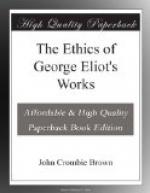Through those long ages of darkness, devil-worship, and polytheism (in its grossest forms all around), the Jew stood up in unfaltering protest against all. Persecutions, proscriptions, tortures in every form, were of no avail. On the gibbet, on the rack, amid the flames, his last words embodied the central confession of Judaism, “O Israel, the Lord thy God is one Lord.” Christianity, the appointed custodier of the still more central truth, “God is love,” had to all appearance failed of its mission; had not only merged its higher message in a theistic presentation, dark and terroristic as that of Judaism at its dawn, but had absorbed into its scheme, under other names, the gods many who swarm all around it; till nowhere and never, save by some soul upborne by its own fervour above these dense fogs and mists, could individual man meet his God face to face, and realise that higher life of the soul which is His free gift to all who seek it. Between this heathenised Christianity and Judaism, the contrast was the sharpest, the contest the most embittered and unvarying. Elsewhere we hear of times of toleration and indulgence even for the hunted Monotheist,—in medieval Christendom, never. The Inquisition plied its rack for the Jews with a more fiendish zeal than even for the hated Morisco. The mob held him responsible for plague and famine; and kings and nobles hounded the mob on to indiscriminate massacre. The Jew lived on through it all,—lived, multiplied, and prospered, and became more and more emphatically the Jew. Is it too much to say that in the West in particular, where this contrast and contest were keenest, Judaism was, during these long ages of terror and darkness, the great conservator of the vital truth of the Divine unity, under whatever forms science or philosophy may now attempt to define this; and in being so, became the conservator of that thought, without the vivifying power of which, howsoever imperfectly apprehended, all human advance is impossible? Is it exaggerating the importance of the Jew and his intense nationality, based on such a truth, to say that, but for his presence, “scattered and peeled,” among all nations, the Europe we now know could not have been? And this indestructible nationality, for whose existence miracle has been called




